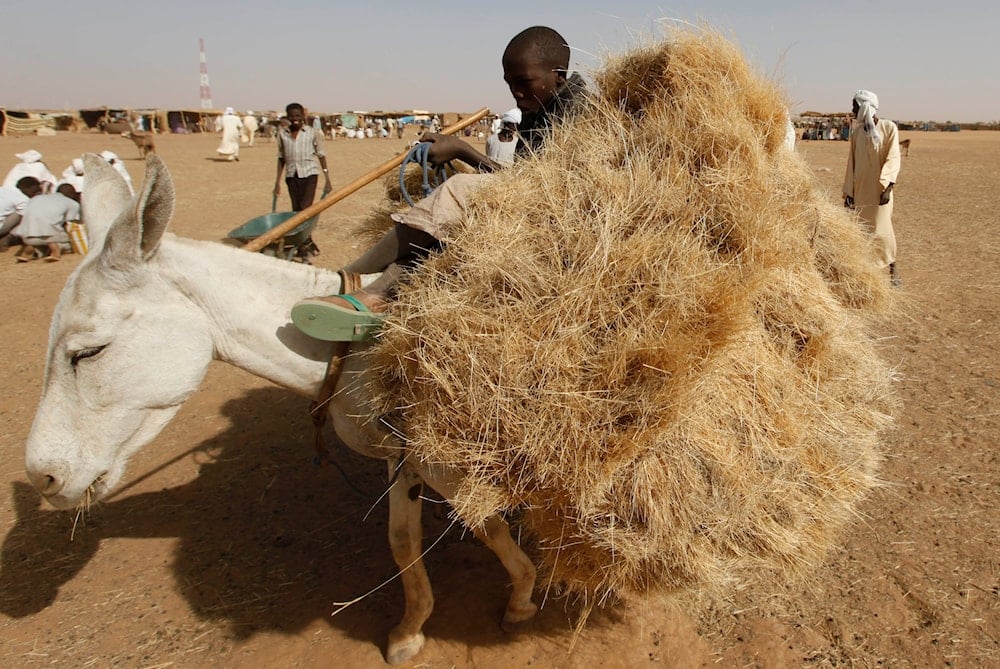Sudan children forced to eat animal feed amid El-Fasher siege
Over 260,000 civilians in El Fasher face starvation and bombardment as the Rapid Support Forces tighten their siege amid Sudan's worsening situation.
-

A Sudanese refugee youth rides his donkey loaded with fodder at the main market during day four of the elections in Sudan at the refugee camp of Abou Shouk at the outskirts of the Darfur town of El-Fasher, Sudan, Wednesday, April 14, 2010 (AP)
At least 260,000 civilians trapped in El-Fasher face an impossible choice: to stay and risk starvation and bombardment, or to flee and risk rape and killing.
The last functioning hospital in the city has been shelled more than 30 times, and every day between 30 and 40 children suffering from severe malnutrition arrive at the health facility seeking help, yet the only thing available to give them is animal feed.
The animal feed, known locally as "ambaz", is a desperate solution because it is prone to fungal contamination, especially during the rainy season.
“People seem to have forgotten us,” Dr. Selik, breaking into tears as he spoke, told The New York Times, “Oh my God, it’s a very painful story.”
El-Fasher turns into a hellish land amid brutal siege
El-Fasher is the most nightmarish battleground in Sudan's conflict, and for nearly 18 months, this city in the western Darfur region has been under siege by paramilitary forces attempting to starve it into submission, as the fighters have built a 32-kilometer earthen wall around its perimeter.
More than 500,000 people have fled El-Fasher since last April, when the Rapid Support Forces overran the famine-stricken Zamzam camp just seven miles south of the city, killing between 300 and 1,500 people in what the United Nations has described as one of the worst massacres of the war.
A month later, the Rapid Support Forces began encircling the city with a massive earthen wall, according to satellite imagery published by the Yale School of Public Health, and as recently as August 27th, work to expand this berm was still ongoing.
Fighters don't differentiate between aid, foes
An estimated 260,000 people remain trapped in El-Fasher by the tightened siege, where a kilo of pasta now sells for $73, ten times its normal price, according to Taha Khater, one of the few remaining aid workers in the city speaking by phone. Khater's group, known as the Emergency Response Rooms, has recorded 14 child deaths from malnutrition in the past two weeks alone, while a cholera outbreak is also spreading.
United Nations food convoys, which have been unable to deliver supplies to El-Fasher for over a year, have come under attack by drones as they neared the city: a June strike hit a convoy of 15 trucks, killing five aid workers, and last month another strike destroyed three trucks and forced the rest to turn back. It remains unclear which party is responsible for the attacks.
International aid groups are providing assistance in Tawila, a small town 40 miles to the west, now struggling under the weight of more than 600,000 refugees. The journey there is perilous as fighters roam the area to rob and extort fleeing civilians, and the road is lined with hastily dug graves and abandoned bodies, according to aid workers.
"They are just left there," said Sylvain Penicaud, the head of the Doctors Without Borders hospital in Tawila, speaking by phone.
Hospitals lose their protected status
Hospitals have been a primary target in the conflict, and of the roughly 200 medical facilities in El-Fasher before the war, only one remains, the Saudi Hospital, where a handful of besieged doctors struggle to survive amid the bombardment, starvation, and dwindling medical supplies.
The hospital has been targeted more than 30 times so far, with the worst attack occurring in January when a Rapid Support Forces drone fired a missile into a crowded ward, killing 70 patients and staff, according to Dr. Suleiman, a senior physician working there.
Now, doctors take shelter in trenches during airstrikes, and malnourished patients are forced to rely on animal feed, said Dr. Suleiman, who asked that his name not be used because he has received death threats for his work.

 4 Min Read
4 Min Read








